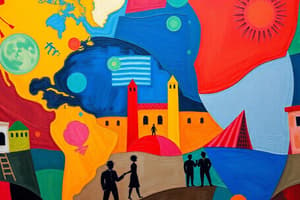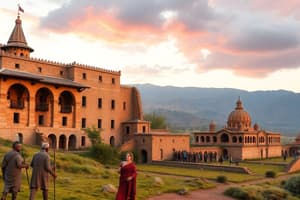Podcast
Questions and Answers
The ______ Road was a major trade route connecting China with the Mediterranean region.
The ______ Road was a major trade route connecting China with the Mediterranean region.
Silk
During the ______ of Exploration, European explorers sought to find new trade routes and spread Christianity.
During the ______ of Exploration, European explorers sought to find new trade routes and spread Christianity.
Age
The ______ engine was a key innovation of the Industrial Revolution.
The ______ engine was a key innovation of the Industrial Revolution.
Steam
The ______ War was a period of geopolitical tension and competition between the United States and the Soviet Union.
The ______ War was a period of geopolitical tension and competition between the United States and the Soviet Union.
European powers established colonies in Africa, Asia, and the Americas through ______.
European powers established colonies in Africa, Asia, and the Americas through ______.
The ______ Road facilitated the exchange of goods, ideas, and cultures between East Asia, Central Asia, and Europe.
The ______ Road facilitated the exchange of goods, ideas, and cultures between East Asia, Central Asia, and Europe.
During the ______ of Exploration, key figures included Christopher Columbus, Vasco da Gama, and Ferdinand Magellan.
During the ______ of Exploration, key figures included Christopher Columbus, Vasco da Gama, and Ferdinand Magellan.
The transition from manual labor to machine-based manufacturing characterized the ______ era.
The transition from manual labor to machine-based manufacturing characterized the ______ era.
The ______ War led to the division of Europe into Eastern and Western blocs.
The ______ War led to the division of Europe into Eastern and Western blocs.
Imperialism was driven by motivations including economic gain, strategic advantage, and the spread of ______.
Imperialism was driven by motivations including economic gain, strategic advantage, and the spread of ______.
Flashcards are hidden until you start studying
Study Notes
Silk Road
- Major trade route connecting China with the Mediterranean region (2nd century BCE - 15th century CE)
- Facilitated exchange of goods, ideas, and cultures between East Asia, Central Asia, and Europe
- Key goods traded: silk, spices, tea, porcelain, and precious stones
- Played a significant role in the development of civilizations, including the Roman Empire, Byzantine Empire, and Chinese dynasties
Age of Exploration (15th-17th centuries)
- Period of European exploration and colonization of the Americas, Africa, and Asia
- Key figures: Christopher Columbus, Vasco da Gama, Ferdinand Magellan, and Juan Sebastián Elcano
- Motivations: spread of Christianity, search for new trade routes, and desire for wealth and power
- Consequences: transfer of plants, animals, and diseases between the Old and New Worlds, and the devastation of indigenous populations
Industrialization (18th-19th centuries)
- Transition from manual labor to machine-based manufacturing, and from rural to urban societies
- Key innovations: steam engine, textile machines, and railroad
- Impact: increased productivity, economic growth, and urbanization, but also exploitation of workers and environmental degradation
- Countries that industrialized first: Britain, followed by other European nations and the United States
Cold War (1945-1991)
- Period of geopolitical tension and competition between the United States and the Soviet Union
- Key features: proxy wars, espionage, propaganda, and the threat of nuclear war
- Divided Europe into Eastern and Western blocs, with the Berlin Wall as a physical barrier
- Ended with the collapse of the Soviet Union and the fall of communism
Imperialism (15th-20th centuries)
- Policy of extending a country's power and influence through colonization and domination
- European powers (e.g., Britain, France, Germany, and Belgium) established colonies in Africa, Asia, and the Americas
- Motivations: economic gain, strategic advantage, and the spread of Christianity and "civilization"
- Consequences: exploitation of native resources and labor, destruction of indigenous cultures, and the rise of nationalist and anti-colonial movements
Renaissance (14th-17th centuries)
- Cultural and intellectual movement that originated in Italy and spread to Europe
- Key features: humanism, revival of classical learning, and innovations in art, literature, and science
- Notable figures: Leonardo da Vinci, Michelangelo, Galileo Galilei, and William Shakespeare
- Impact: laid the groundwork for the Enlightenment and the scientific revolution
Age of Isms (18th-19th centuries)
- Period of ideological and intellectual ferment, characterized by the rise of various "isms"
- Key "isms":
- Nationalism: emphasis on national identity and self-determination
- Liberalism: advocacy for individual rights, free markets, and democracy
- Conservatism: support for traditional institutions and social hierarchies
- Socialism: critique of capitalism and advocacy for collective ownership of the means of production
Revolutions
- Key revolutions:
- French Revolution (1789-1799): overthrow of the monarchy and establishment of the First Republic
- American Revolution (1765-1783): independence from Britain and the creation of the United States
- Russian Revolution (1917): overthrow of the tsarist regime and the establishment of the Soviet Union
- Chinese Revolution (1911-1949): overthrow of the Qing dynasty and the establishment of the People's Republic of China
- Causes: political and social grievances, economic inequality, and the spread of Enlightenment ideas
- Consequences: reshaped the modern world, led to the rise of new ideologies, and inspired future revolutions
Studying That Suits You
Use AI to generate personalized quizzes and flashcards to suit your learning preferences.




